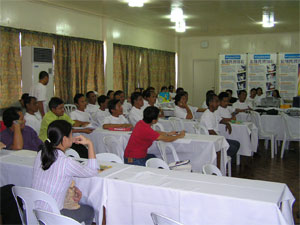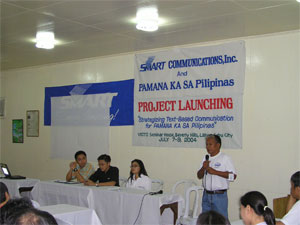
Partnership Overview
Project Launching
Strategizing Text-based Communications
Keywords
 |
The members of PAMANA are small marine sanctuaries scattered in coastal community sites nationwide. Gathering views and coordinating information from them is a gargantuan effort. The lack of an effective and efficient communication system inhibits PAMANA in its desire to provide timely and relevant information to its members. Without an existing website, enough technology and computer hardware, the alliance can only rely on its existing directory of Catalysts and Partners to relay information, send out invitations, and gather data, and conducting actual site visit only for areas with limited or no access to other faster and reliable means of communication.
Faced with this challenge, the PAMANA leadership and secretariat, with the intervention of Haribon Foundation, came up with the project of establishing an effective, efficient, and sustainable national communication system. It had been perceived as a response to addressing the key issues that have strategic impacts to the development of fishing areas and the lives of small fishers in PAMANA's 6,280 fisher members nationwide. The project was billed the Establishment of an Effective, Efficient, and Sustainable National Communication System for Marine Protected Area Practitioners , and requested a grant of 168 cellular/satellite phones and 168 computers and technical assistance on the establishment of PAMANA's communication system. This was presented to SMART Communications, Inc. (SMART) in the early weeks of May 2004 and was officially launched during the PAMANA National Council Meeting held in Cebu City on July 2004.
SMART responded by granting 245 cellular phones for distribution to the 122 member sites and the catalysts in each ecosystem-based chapter. Additional technical assistance came in the form of a program with internet access that would provide a database for monitoring the members, and facilitate Short Message Sending (SMS) technology using keywords provided by SMART and PAMANA. This was made possible with the help of SMART's subsidiary corporation, the I-Contacts Corporation or I-CON and billed as Strategizing Text-Based Communication for Pamana Ka Sa Pilipinas.
At present, 93% of the phones have been delivered to the sites through each chapter representative, and some of the catalyst partners from the sites. Most are being used for MPA enforcement while 77 are for business.
Project Launching
The project was formally launched in July 9, 2004 during the National Council Meeting. Key personalities from the SMART Main Office, led by Darwin F. Flores, Senior Manager for Community Partnerships, arrived with an initial release of 22 units of Nokia 3315 cellular phones with SIM Cards for free for the Council Representatives in attendance. SMART equipped the alliance with the phones to help strengthen its capacity and networking. The project presentation drew positive and warm response from the members especially with the presentation of a new aspect introduced by SMART – the opportunity for business, the Talk N'Text Partnership. The members were given several materials that they could use in the possible conduct of business in their areas, in addition to having the basic tool to aid them in their enforcement practices, namely, the cellular phone. There was also a demonstration of the instant message send-and-reply system of SMART and PAMANA's internet-based communication. This is the text-based communication system developed for PAMANA through the I-CON, a subsidiary of SMART Communications.
 |
A site visit was conducted on two of PAMANA's members on the following day, July 10, 2004 . A troop of SMART Officers, led by SMART's Public Affairs Head Ramon R. Isberto, with the coordination of Ms. Marlyn Rivera, went with PAMANA's Visayas Regional Coordinator Jourdel Mario Añabieza and Danajon Bank Chapter Representative Eugenio Mula to Bohol to test the effectiveness of the communication system. Two PAMANA sites were visited – Macaas in Macaas, Tubigon, Bohol and Batasan Island . Joining the group were Atty. Maria Jane Paredes, Lourdes Bersalote and NN Navarro from SMART, Don Geoff Tabaranza from Pamana, Soc Banzuela of Haribon Foundation, and several media representatives.
Distribution of Cellular Phones
In the last week of July 2004, SMART sent the additional 215 cellular phones to PAMANA. These were the units for distribution to the different member sites and catalysts nationwide. The third set of units sent were the 3 units intended for PAMANA's staff in Luzon. The actual distribution of phones from PAMANA to its Chapters took some time to realize. By September 2004, the Regional Coordinators for Visayas and Mindanao, Jourdel Mario Añabieza and Gonzalo Reyes, respectively, were able to distribute 93% of the cellphones.
 |
Project Objectives
The project aimed to addressed the twin issues of poverty and environmental degradation in at least 122 coastal barangays around the country by further empowering the fisher organizations and other stakeholders especially the local NGO/PO/LGU catalysts to better manage their established marine protected areas and to create a more policy environment for the enforcement and growth of Marine Protected Areas (MPAs) in the Philippines. This was to be done through the establishment and implementation of an effective, efficient, and sustainable national communication system.
The project would increase the networking capacity of PAMANA around three key result areas such as:
• Membership and Catalyst Development, to effectively and efficiently respond to community organizing, legal, technical, financial, managerial, research, monitoring, and documentation capacity-building needs of some 122 leading Marine Protected Areas in the Philippines;
• Policy Advocacy, to influence the policy environment that will enhance the growth and number of marine protected areas in the country by producing sound and cutting-edge policy proposals based on field research and responsive to the needs of small fishers and MPA managers and by effectively mobilizing and broadening the constituency for MPAs; and,
• Organizational and financial sustainability, to ensure the long-term financial and organizational viability of PAMANA as an effective and efficient national alliance of MPA practitioners.